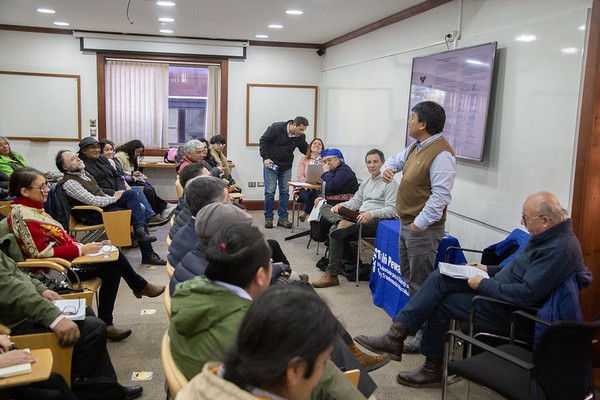Proposal suggests handing over 385,000 hectares of agriculturally suitable land. Minister avoided commenting on the substance of Millabur and Gallupe's text, awaiting agreements from the Peace and Understanding Commission.
The Minister of the General Secretariat of the Presidency (Segpres), Álvaro Elizalde, was asked yesterday about the controversy sparked by the proposal made by commissioners Adolfo Millabur and Gloria Callupe within the framework of the Peace and Understanding Commission mandated by President Gabriel Boric to define land restitution policies for Mapuche communities.
Specifically, Millabur and Callupe proposed the restitution of lands totaling 385,000 hectares of agricultural soil, which generated significant controversy among lawmakers and experts. They also propose pardoning "all those convicted in the context of territorial claims, who are not involved in violent crimes, offenses against human dignity, or common crimes." Former Southern Macrozone Coordinator Pablo Urquízar responded that it is unacceptable to legitimize the use of violence in this way.
Minister Elizalde, in charge of the Peace and Understanding Commission, avoided engaging in debate over the proposal and emphasized that "we must await the commission's conclusions, and once they present their proposals, there will obviously need to be a democratic debate on the matter. We hope for an agreement because when this commission was established, the goal was always to create state policies rather than those of a specific government. We are waiting for the commission's conclusions."
The Secretary of State insisted that "I will not preemptively share a viewpoint on pending conclusions," explaining that this was to avoid hindering the commission's work.
The Executive Branch has opted for caution when analyzing the proposal by commissioners Millabur and Gallupe. They note that these are documents that have been in the works for some time and that this is just one of several proposals made within the commission. They also stress that all stakeholders in this commission will have to compromise if they want a positive outcome, even if it comes at a political cost to their respective sectors.
Additionally, they urge against premature debates on a process that has not yet concluded.
Senator Francisco Huenchumilla, a member of the commission, also commented on Millabur and Callupe's proposal. On Emol TV, the legislator stated that "it is not good to draw hasty conclusions. I would call for prudence from all political actors and ask that they allow us to work with the necessary discretion." He added that these issues are complex, so realism is essential in the proposals being debated. Huenchumilla warned that these ideas must gain agreement from various stakeholders: forestry companies, the Mapuche people, residents of the four regions, the Ministry of Finance, among others.
"I have some doubts, and I am putting all my efforts into resolving these critical knots," said the Christian Democracy senator.
Meanwhile, opposition criticism of Millabur and Callupe's proposals continues.
Deputy Gloria Naveillán said, "The commissioners aren’t just going two or three towns too far—they’re crossing entire continents and countries because, frankly, I don’t think they’ve understood that all these proposals, which are almost a state within another state, show a complete lack of understanding. They are part of the Chilean State, and none are superior or inferior to the rest, so one of the rules is to respect the rule of law."
Naveillán urged the commissioners to remember the failure of the Constitutional Convention, where citizens rejected some of these proposals.
Urquízar and the Pardon Proposal: "The Use of Violence Can Never Be Legitimized"
The former Southern Macrozone Coordinator during the previous administration, Pablo Urquízar, addressed Millabur and Gallupe's proposal, which includes pardoning individuals convicted for territorial claim-related offenses. On this, he stated, "There are frankly complex proposals, such as pardoning those convicted in the context of territorial claims. Under that premise, Héctor Llaitul could, for example, be freed, which is unacceptable. The use of violence as a political method can never be legitimized. Such pardons are inappropriate."
Regarding land restitution, Urquízar analyzed that "the proposal has no boundaries and does not consider titles effectively recognized by the State, such as Land Grants. This seriously risks being irresponsible by creating unfulfillable expectations without solid legal backing. If the commission fails to chart viable, serious, responsible, and rule-of-law-compliant paths, it will become a problem for the Southern Macrozone rather than a solution."
Source:El Mercurio







Comentarios (0)
No hay comentarios aún. ¡Sé el primero en comentar!
Deja un comentario